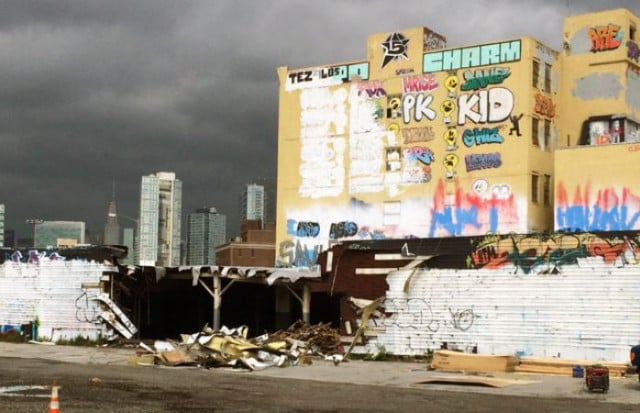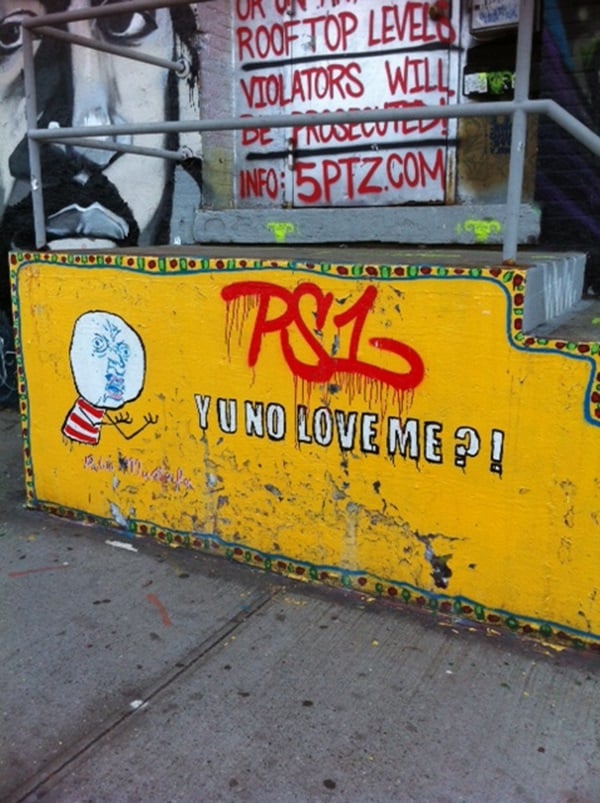Art & Exhibitions
Nine Artists File Federal Lawsuit Against Owner of 5Pointz Property
Artists say they should have been notified before works were painted over.

Artists say they should have been notified before works were painted over.

Eileen Kinsella

Nine artists have filed a federal lawsuit against the owner of the 5Pointz, a former graffiti mecca in Long Island City, Queens.
On the evening of November 19, 2013, the space was whitewashed ahead of its transformation into condos (see Developers Who Razed 5Pointz Seek to Trademark Its Name).
The artists are seeking damages for unlawful destruction of their works in violation of the Visual Artists Rights Act (VARA). In an earlier action, the artist sought to challenge the planned construction changes by relying on copyright restrictions to mount a legal claim (see Petition Launched Against Developers).
In the latest lawsuit, filed June 3 in US District Court for the Eastern District of New York, the artists charge that the defendants—property owner Gerald Wolkoff and related realty companies—”destroyed mutilated, modified and defaced each and every one of the works of art installed by Plaintiffs on 5Pointz “[without] notice in writing regarding their intent to destroy the artwork nor did they afford Plaintiffs…a period of 90 days after receiving such notice either to remove the work or pay for its removal.”
The artists included in the claim are: Maria Castillo; James Cochran; Luis Gomez; Bienbenido Guerra; Richard Miller; Kai Niederhause; Carlo Nieva; Rodnet Rodriguez; and Kenji Takabayashi.
For more than a decade, Wolkoff allowed artists to create and display their work “on the exterior and interior of a derelict property owned by Defendants…” the complaint states. “Over the years, the spectacular artistic creations blossomed into an international tourist attraction and transformed the neighborhood from a virtual wasteland into an attractive place for residential development.”

artnet found no love in 5Pointz.
Photo: Eileen Kinsella.
In 1993, Wolkoff even gave artist Jonathan Cohen, an artist who goes by the name “Meres One,” authority to curate the artworks, as well as giving him keys and access to numerous spaces to work and store supplies on the 5Pointz grounds (see 5Pointz Creator Meres One Makes Appearance on Street Art Throwdown). Cohen presided over the entire process of approving and installing proposed artworks.
Wolkoff had three rules: no political, religious or pornographic messages.
The suit says artists came from as far away as Kazakhstan, Australia, Japan, and Brazil for the opportunity to paint their works on the 5Pointz.
Fashion designer Donna Karan used photographic murals depicting 5Pointz on the walls of her Madison Avenue store, and singer Joss Stone filmed the music video for one of her songs.
In the months before the whitewashing—and in preparation for the razing of the building—the realty company began efforts to evict Cohen from one of the multiple 5Pointz spaces that Wolkoff had given him permission to use (see Destruction of 5Pointz Graffit Mecca is Underway).
Cohen then settled with the company and agreed to vacate the spaces on or before November 30, 2013. However, the complaint charges that “at no time did Defendants ever warn Plaintiffs of intent to destroy the artwork prior to the demolition of the structure itself.”
It goes on to say that “Defendants had already announced their plans to dismantle the commercial structures that held Plaintiffs’ artwork in order to erect new structures for residential housing, meaning that the whitewashing was entirely gratuitous and unnecessary.”
Doing so prevented the artists from having an opportunity to record, preserve or remove their artwork which “could have been readily accomplished prior to or during the demolition of the building or with legal notice.”
The complaint alleges that instead, Wolkoff “chose to act in a manner that can only be seen as having been intended to cause intense shock and emotional trauma by inflicting an egregious public insult and destruction of protected artwork.”
The artists say white paint was slapped onto the artwork in “a haphazard fashion”, stating that “a smiley face was applied to some of the artwork with white paint. The result is the replacement of something beautiful with something profoundly ugly.”
The claim states that all of the plaintiffs maintained ownership and copyright interests in their works, subject to the protection of VARA. They are seeking damages for financial losses.
However, the “negative effects” claimed to be a result from the removal of their work was somewhat perplexing.
These included claims for: “damage to their honor and reputation and for their humiliation, mental anguish, embarrassment, stress and anxiety, loss of self-esteem, self confidence, personal dignity, shock, emotional distress, inconvenience, emotion pain [sic] and and suffering and any other physical and mental injuries Plaintiffs suffered due to Defendants improper conduct pursuant to VARA and the common law.”